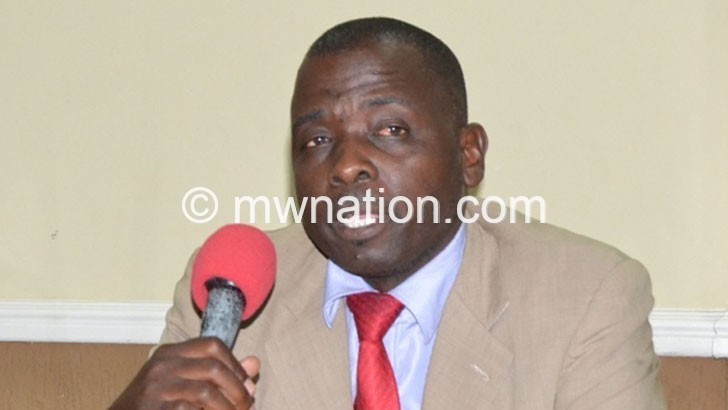Teachers defy govt on strike
Teachers Union of Malawi (TUM) has defied a Ministry of Education, Science and Technology (MoEST) order to suspend the planned teachers’ strike to push for payment of their December 2019 salaries.
While MoEST based its order on the fact that payment of teachers’ salaries would start today, TUM says it will proceed with the sit-in.
TUM said about 5 000 teachers were removed from the payroll alongside other civil servants for not submitting details of their national identity cards, a development that led to them not getting paid their December salaries.

In an apparent reaction to TUM’s announcement of the strike on Friday, MoEST Principal Secretary Justin Saidi on Saturday requested the teachers to consider suspending the sit-in.
He said arrangements were being put in place to pay them on production of national IDs at pay points and that teachers should commit to remain calm as the issue is being sorted out.
Said Saidi: “Government remains committed to work with TUM in addressing grievances of teachers as it has shown before with scores of grievances addressed from the 2018/19 fiscal year and beyond, which among them, include massive promotions, timely payment of salaries and leave grants and payment of arrears.”
But in a telephone interview yesterday, TUM secretary general Charles Kumchenga said despite the ministry’s assurance to pay the affected teachers, they would only resume work after all of them are paid.
He said: “Such assurances have been given to the teachers on numerous occasions. We are tired of such empty promises. The ministry is not being sincere, so we are not turning back. We will proceed as planned.”
Kumchenga said downing their tools was the best way to express the teachers’ displeasure.
In its letter announcing the strike, TUM said: “Be informed that from Monday the 20th of January 2020 [today] teachers and TTC lecturers will be gathering at their respective DCs [district commissioners] offices from 7am up to 4:30pm and this will be done up to the date they will get their salaries. In this case, they will not be delivering in schools and colleges.”
In separate interviews yesterday, education rights activists also expressed concern over the delays in paying the teachers, saying such issues lead to demotivation.
Civil Society Education Coalition (Csec) executive director Benedicto Kondowe said the teachers are justified in holding the industrial action, saying through meetings that have taken place regarding the issues, MoEST has not been sincere.
He said: “Government is not being sincere with the teachers, considering that the matter does not have anything to do with the teachers but the ministry itself.
“Teachers submitted the IDs because we have also been consulting on the issue since TUM is our member.
“Therefore, we totally endorse the strike so that teachers must express their concerns. We cannot continue with business as usual and our expectations are that the teachers will revert to work once they are all paid at once.”
Education activist Steve Sharra also said it was a matter of concern that teachers continue to be subjected to such issues when education standards are on the decline.
The teachers were removed from the payroll, among thousands of other civil servants, following a decision to use the national identity card as the primary source of recognition in a move to flush out ghost workers from the system.
On the status of other civil servants who were affected, Ministry of Finance, Economic Planning and Development spokesperson Davies Sado said the issue is being treated with urgency.
He said: “With regards to those who were skipped due to the mandatory presentation of national identities, the matter is being addressed with the urgency it deserves at institutional levels. As for the teachers affected, the line ministry has provided an update, including time-frames on how they are handling the matter.
“But all in all, what should be appreciated is that it is a requirement that everyone on government payroll or pension payroll should have his or her employment or pension number linked to the national identity number.”
In 2017, the teachers, who constitute almost half of the 130 000 civil service workforce, also staged a strike that paralysed learning in both primary and secondary schools after government delayed to pay them leave grants for the 2016/17 financial year.
The development, in turn, also led to learners staging protests across the country to force government to address their teachers’ demands, which in some cases also turned violent as police used tear gas to disperse the learners.





